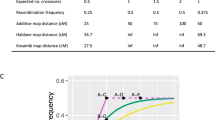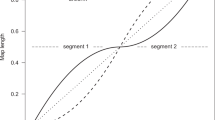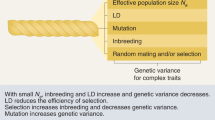Abstract
THERE is increasing evidence that linkage intensity between genes is under genetic control1–4. Fisher5 indicated that linkage intensity is modifiable by natural selection. Following Fisher's suggestion, Kimura6 developed a model of a genetic system which leads to closer linkage by natural selection in diploid organisms, taking into account a mechanism such as inversion for reducing crossing over.
This is a preview of subscription content, access via your institution
Access options
Subscribe to this journal
Receive 51 print issues and online access
$199.00 per year
only $3.90 per issue
Buy this article
- Purchase on Springer Link
- Instant access to full article PDF
Prices may be subject to local taxes which are calculated during checkout
Similar content being viewed by others
References
Bodmer, W. F., and Parsons, P. A., Adv. Genet., 11, 1 (1962).
Nei, M., Genetics, 57, 625 (1967).
Bernstein, H., Genetics, 56, 755 (1967).
Jha, K. K., Genetics, 57, 865 (1967).
Fisher, R. A., The Genetical Theory of Natural Selection (Clarendon Press. Oxford, 1930).
Kimura, M., Evolution, 10, 278 (1956).
Nei, M., Kojima, K., and Schaffer, H. E., Genetics, 57, 741 (1967).
Watson, J. D., Molecular Biology of the Gene (Benjamin, New York, 1965).
Pontecorvo, G., Trends in Genetic Analysis (Columbia Univ. Press, New York, 1958).
Stahl, F. W., and Steinberg, C. M., Genetics, 50, 531 (1964).
Fatting, W. D., and Lanni, F., Genetics, 51, 157 (1965).
Gough, M., and Levine, M., Genetics, 58, 161 (1968).
Jacob, F., and Wollman, E. L., Sexuality and the Genetics of Bacteria (Academic Press, New York, 1961).
Taylor, A. L., and Thoman, M. S., Genetics, 50, 659 (1964).
Hopwood, D. A., Genetics, 51, 1177 (1966).
Mortimer, R. K., and Hawthorne, D. C., Genetics, 53, 165 (1966).
Finchum, J. R. S., and Day, P. R., fungal Genetics (Blackwell, Oxord, 1963).
Stahl, F. W., Edgar, R. S., and Steinberg, J., Genetics, 50, 539 (1964).
Drake, J. W., Proc. US Nat. Acad. Sci., 58, 962 (1967).
Thomas, C. A., Progress in Nucleic Acid Research and Molecular Biology (edit. by Davidson, J. N., and Cohn, W. E.), 315 (Academic Press. New York, 1966).
Haldane, J. B. S., J. Genet., 12, 101 (1922).
Author information
Authors and Affiliations
Rights and permissions
About this article
Cite this article
NEI, M. Evolutionary Change of Linkage Intensity. Nature 218, 1160–1161 (1968). https://doi.org/10.1038/2181160a0
Received:
Issue Date:
DOI: https://doi.org/10.1038/2181160a0
This article is cited by
-
Genetic dissection of an alien chromosomal segment may enable the production of a rice (Oryza sativa L.) genotype showing shoot developmental instability
Development Genes and Evolution (2015)
-
Pairomics, the omics way to mate choice
Journal of Human Genetics (2013)
-
Duplicate Gene Evolution Toward Multiple Fates at the Drosophila melanogaster HIP/HIP-Replacement Locus
Journal of Molecular Evolution (2009)
-
Examining Emergence of Functional Gene Clustering in a Simulated Evolution
Bulletin of Mathematical Biology (2007)
-
Unusual linkage patterns of ligands and their cognate receptors indicate a novel reason for non-random gene order in the human genome
BMC Evolutionary Biology (2005)
Comments
By submitting a comment you agree to abide by our Terms and Community Guidelines. If you find something abusive or that does not comply with our terms or guidelines please flag it as inappropriate.



